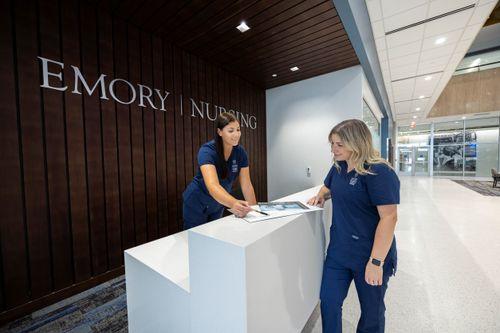
Caption
The Nell Hodgson Woodruff School of Nursing Emory Nursing Learning Center is located in downtown Decatur, Georgia, but is designed to train nurses to connect rural residents to health care.
Credit: Emory University
|Updated: October 3, 2022 10:11 AM
LISTEN: Emory’s new Nursing Learning Center in Decatur is using simulation to train new nurses to help address a shortage of workers. GPB’s Ellen Eldridge has more.

The Nell Hodgson Woodruff School of Nursing Emory Nursing Learning Center is located in downtown Decatur, Georgia, but is designed to train nurses to connect rural residents to health care.
Applications to Emory University’s Nell Hodgson Woodruff School of Nursing are soaring, Dean Linda McCauley says.
“We wanted to grow from 400 students to over 1,400 students,” McCauley said. “We needed more space, but we needed a different type of space.”
The new Emory Nursing Learning Center (ENLC) in downtown Decatur is a $20.6 million, 70,000-square-foot expansion featuring state-of-the-art simulation and professional development space that will enable students to be the next generation of nurse leaders.
The center was created to address the significant nursing shortage in the United States, and serves undergraduates and continuing education students as well as advanced practice nursing professionals.
Its campus has a skills lab that includes simulated patients and equipment so students can have workplace experiences that are as close to real life as possible, McCauley said.
A home apartment is completely wired with cameras and audio to simulate how family members take care of their loved ones in an environment that allows students to see some of the real problems that families face when they take their loved ones’ home.
The program also includes a dedicated room for telehealth.
“During COVID, we learned so much about what patients love about telehealth, what clinicians love about it,” McCauley said.

Linda McCauley (left) and Sharon Pappas stand in the new Emory Nursing Learning Center.
Over the pandemic, many patients needed ventilators and extracorporeal membrane oxygenation, or ECMO, machines that pump blood from a patient's body to an artificial lung, which adds oxygen and removes carbon dioxide.
“We have the facility here to house a new program in Georgia to train people in Georgia to run heart/lung machines, these ECMO machines,” McCauley said.
Nursing students can also learn how to do things that they were not able to do in their rural communities, and school administrators anticipate a lot more rural outreach, she said.
Over the past five years, the School of Nursing has had a phenomenal increase in community-based demonstration projects, McCauley said, such as conducting interventions around maternity care in South Georgia’s Colquitt County.
“This week we just found out that we are receiving a $4 million grant to take mobile care units down to South Georgia, to communities where access to care is really challenged,” McCauley said. “And our students love doing that. Our faculty love extending their reach beyond Atlanta.”
The grant allows the school to start with two mobile vans.
PREVIOUS REPORTING:
Pandemic Leads To Health Care Worker Burnout, Career Changes, Hospital Staffing Issues
How Georgia Hospitals Are Addressing Health Care Worker Burnout, COVID Fatigue
1 in 5 Georgians quit jobs to be caregivers during the COVID-19 pandemic. Here's why
The COVID pandemic also chased health care workers out of the field.
“In the face of a critical nationwide nursing shortage, the need for nurses has never been more evident,” said Dr. David S. Stephens, Emory’s interim executive vice president for health affairs and interim executive director of the Woodruff Health Sciences Center.
Three years of overwhelming numbers of COVID-19 patients and unpredictable situations have taken a toll on the health care profession.
Sharon Pappas, the chief nursing executive for Emory Health Care said society owes a lot of gratitude to nurses across the world for their role.
“We're just very pleased and honored to be able to contribute to restoring the nursing profession and in adapting us to what the needs are and to the future.”